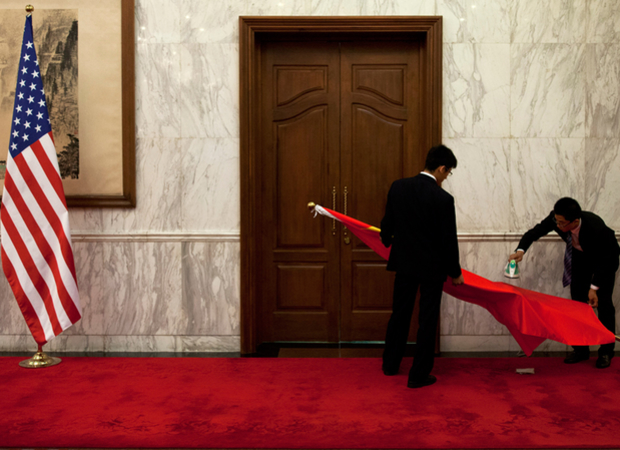U.S.-China Meeting’s Aim
The two day meeting is an enormous bet on the power of personal diplomacy, in a setting carefully chosen to nurture a high-level friendship.
The two day meeting is an enormous bet on the power of personal diplomacy, in a setting carefully chosen to nurture a high-level friendship.
This weekend's gathering is more informal than other meetings. The leaders of the world's two biggest economies have a rare chance to get to know one another on top of the official business about trades, security and global power....

As we approach the June 7-8 meeting in California of U.S. President Barack Obama and Chinese President Xi Jinping we are holding a small contest. We have asked ChinaFile Conversation regulars and a few guests to envision their ideal...
There is no way to rebalance the global economy, slow climate change, manage the trouble kicked up by rogue states and keep the peace in Asia unless Washington and Beijing work together in as many areas as possible.
Evan Osnos and others discuss the U.S.-China relationship before an upcoming Obama-Xi meeting, covering the topics of cyber security and the two countries’ mutual “strategic distrust.”
President Obama and the general secretary of the Chinese Communist Party, Xi Jinping, will meet June 7–8 in California. The meeting has been characterized as a way for the two to establish a personal relationship and build trust. This would all...

Susan Shirk:
It’s an excellent idea for President Obama and President Xi to spend two days of quality time together at a private retreat in Southern California. Past meetings between Chinese and American presidents have been too...
The June 7 and 8 meeting will likely find the two leaders discussing several hot-button issues such as North Korea’s recent belligerence, cyberattacks, and tension in the South China Sea.

On Monday, within hours of the announcement that Chinese President Xi Jinping will meet U.S. President Barack Obama on a visit to...
Some Obama advisers have recommended harsh action to send a clear signal to China to change its ways. But even if the Americans retaliate, China is unlikely to respond as they might hope.
It is not widely accepted that any meaningful relationship can be boiled down to a single index that quantifies where it is at any moment and whether it is “better’’ or “worse” than a week or a month ago.
The partisan dissonance exhibited at President Barack Obama’s State of the Union address was a sight for sore eyes for some users on Sina Weibo, China’s microblogging platform.
President Barack Obama signed an executive order aimed at helping protect the computer networks of crucial American industries from cyberattacks and prodded Congress to enact legislation that would go even further.
EARS shut to the impending chorus of international condemnation, North Korea conducted its third nuclear test on February 12th. It said the detonation was of a “smaller and light” atomic bomb that was different from its previous two, and that it...
U.S. policy of engagement with Beijing has not been as effective in shaping its rise to superpower status as Washington had hoped.
On his first trip to China as Secretary of State, Sen. Kerry should make the rhetorical case for a positive future vision of the bilateral relationship based on rules.
The gap between the strength of China and the US will narrow. Previous experiences in international politics will be viewed as realistic reasons to exacerbate tensions between the two sides. This is a dangerous era.
This year may prove to be a pivot point, when the myths that China and the world had adopted about the politics and economics of the People’s Republic began to erode.
China's claim to a stretch of water off its south coast also claimed by neighbors makes it Asia's biggest potential military hot spot.
The case for China is that its leaders can emphasize long-term planning and difficult decisions over short-term politics and voter-appeasement.
Concern among Chinese officials, executives and academics is growing that U.S. attidudes toward China won't cool post-Election Day.
Eight Chinese watched and discussed Tuesday's U.S. presidential debate at the NPR Shanghai bureau.
China's economic relations with U.S. could feature hotly in next Presidential debate.
China-related holdings by funds in which Mr. Romney has invested are a reminder of how he inhabits two worlds.
Chinese netizens shared mixed views of the U.S. election, some cynical, some optimistic.
Republican presidential candidate Mitt Romney’s promise to get tough with China may fall on receptive ears in the U.S., but in China his vow has barely registered, much less caused alarm. Unlike in 2008, when the Chinese media and bloggers were...
Providing their respective hopes and expectations on what they would like to see in the Obama administration’s China policy are Liu Xuecheng and Robert Oxnam, who both envision opportunities for reframing the China-U.S. relationship in a way that...